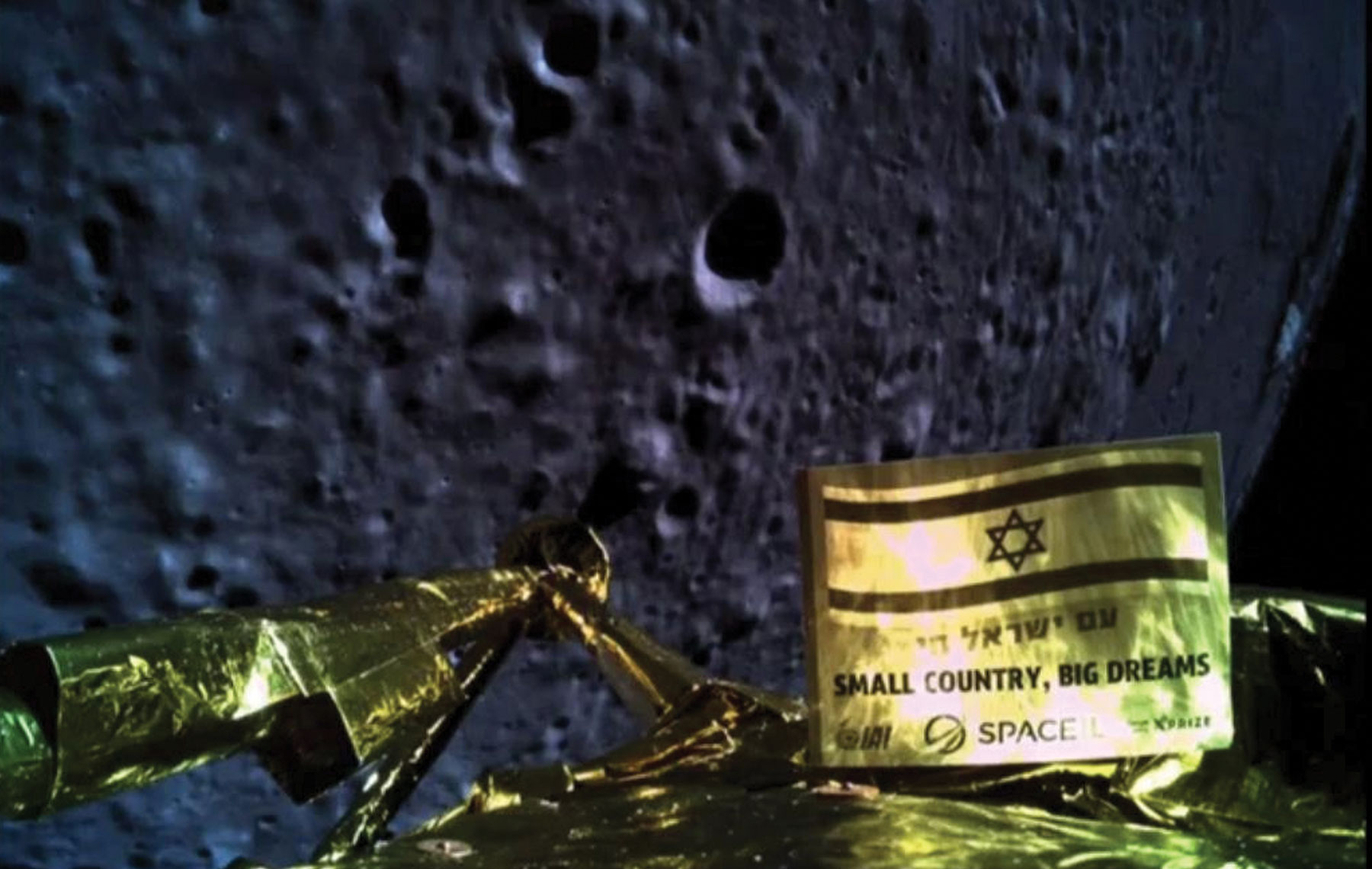 An image taken by Israeli
spacecraft Beresheet, after
crash landing on the moon.
Photo courtesy of Space IL
An image taken by Israeli
spacecraft Beresheet, after
crash landing on the moon.
Photo courtesy of Space IL Like any great quest, there are ups and downs, and if the heroes are lucky, they learn something. Such was the case for the Israeli spacecraft Beresheet.
Beresheet (the Hebrew name for the Book of Genesis, or “in the beginning”) was the privately funded spacecraft constructed by SpaceIL and Israel Aerospace Industries (IAI) that crash-landed on the moon’s surface on April 11.
Yariv Bash, Kfir Damari and Yonatan Winetraub, the engineering team behind the spacecraft, started the project in 2013. Weighing just over 1,322 pounds (600 kilograms), it was said to be the smallest vessel to ever land on the moon.
In January, the spacecraft finally was ready to travel to Orlando, Fla., to begin the launching process.
“After eight years of hard work, our dream has come true: We finally have a spacecraft,” SpaceIL CEO Ido Anteby said. On Feb. 21, Beresheet was successfully launched on a SpaceX rocket from Cape Canaveral.
“Beresheet landing on the moon is a giant step for all of Israel. This is a first-rate technological, scientific and an educational project,” Israeli President Reuven Rivlin said in a video after the launch.
The stakes were high for the Beresheet mission. It was the first of its kind built by a private company and if it landed successfully, Israel would make history as the fourth country to land a spacecraft on the moon, after the former Soviet Union, the United States and China.
On Feb. 25, Beresheet failed to execute a scheduled maneuver imperative for a trajectory to the moon. On March 19, however, it successfully conducted its final major maneuver and on April 4 entered the moon’s orbit.
Netanyahu said, “If at first, you don’t succeed, you try again.”- Prime Minsiter Benjamin Netanyahu
Hundreds of thousands of people watched the livestream broadcast on landing day. Israeli Prime Minister Benjamin Netanyahu, along with philanthropist, millionaire and investor Morris Kahn and IAI Space Division General Manager Opher Doron spoke about the achievement the world would be watching. The spacecraft was then shown approaching the moon’s surface with a yellow metal flag that said, “Small Country, Big Dreams.”
However, the control room lost communication with the spacecraft at 12:24 p.m. Pacific time.
“We had a failure in the spacecraft,” a SpaceIL engineer said during the livestream. “We were unable to land successfully.”
Nonetheless, Israel became the seventh country to orbit the moon and the fourth to touch its surface.
Netanyahu said, “If at first, you don’t succeed, you try again.”
Following the launch, Peter Diamandis, the X Prize Foundation’s executive chairman, said he and his partner and CEO Anousheh Ansari would award the SpaceIL team with the $1 million Moonshot Award “for them to continue their work and pursue Beresheet 2.0.”
Israeli-based Journal contributing writer Deborah Danan was at IAI headquarters to watch the moon landing and wrote the following on April 12:
“In our nation’s short history, there have been too many times of war and tragedy that result in bringing us together. Rarely, there are moments of euphoria that also bring us together. Last night was such a moment.
“Almost nine years ago, I conducted one of my first on-camera interviews with Kfir Damari, SpaceIL’s co-founder. His passion was as evident then as it was last night. He was proud of having built the ‘smallest spacecraft in the world’ and that the whole project, almost a decade in the making, had Israeli chutzpah written all over it.
At the event, a TV reporter asked the billionaire nonagenarian Morris Kahn, who funded the $100 million venture, how he felt that Netanyahu et al. was catching a ride on his money and his efforts. Kahn said, ‘They’re not catching a [ride]. I gave it to them, and to all of Israel, with love and a full heart.’
His sentiments expressed what everyone felt last night. This moon venture soared far above petty politics. I thought how nice it would be if we could have more of these unicorn moments of positivity to bring us together.
When it became clear that we would not land on the moon, the grown man sitting next to me, an IAI systems engineer, sat very still, his eyes glistening. I cried freely. In that 14-minute-long lunar landing sequence, our nation’s history was summed up. We laugh and we cheer and we cry. We triumph and we crash. But God knows, we’ll never stop trying.”























 More news and opinions than at a Shabbat dinner, right in your inbox.
More news and opinions than at a Shabbat dinner, right in your inbox.